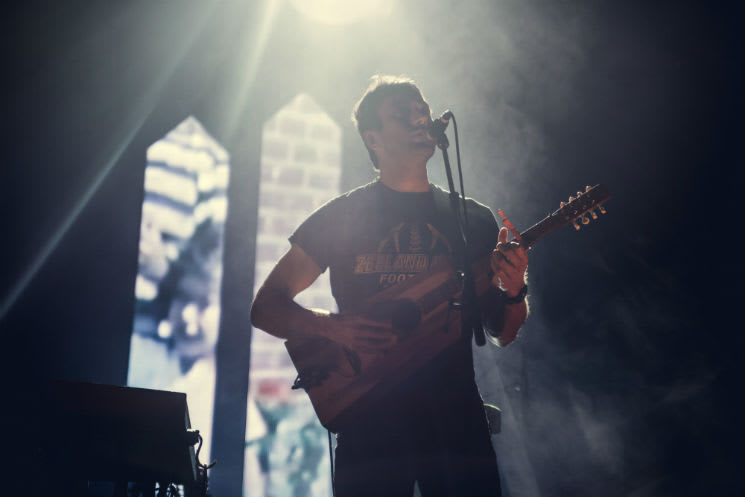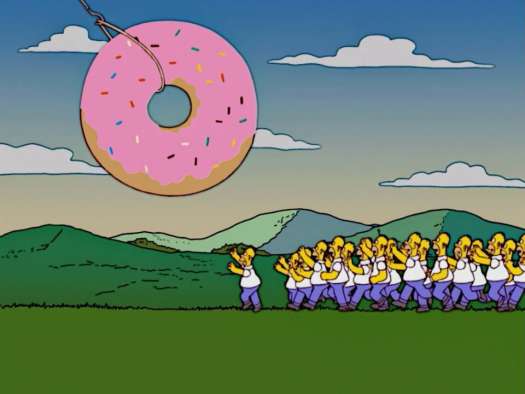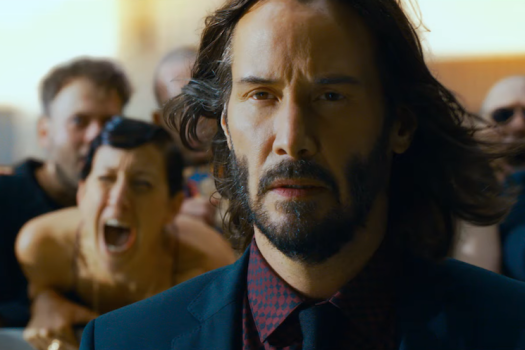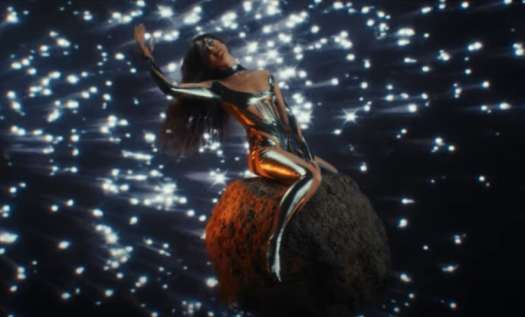High expectations come with a $50 indie rock concert ticket, but it's doubtful anyone last night (June 9) was thinking about the money as they walked away. Sufjan Stevens gave the sold-out crowd a revelatory experience in his first Vancouver appearance in five years, at times so intimate it was almost awkward while other times being so grandiose and massive as to seemingly bring all of creation crashing down around the fabulously appointed Orpheum Theatre.
Stevens delivered the entirety of Carrie & Lowell in his two-hour-long set, peppered with thematically relevant selections from across his catalogue: a few tracks from Illinoise and Seven Swans, a couple from the All Delighted People EP and Greetings from Michigan and "Futile Devices" from The Age of Adz. Their presentation was accentuated by the cleverest of lighting cues and projections across a series of diamond-shaped screens, alternately showing relevant scenes of nature or Super 8 childhood footage.
To see Stevens wipe the moisture from his face as a sunset disappeared into the clouds behind him after his rendition of the solo acoustic guitar ballad "Eugene" was to be moved. When the full band of multi-instrumentalists reached a crescendo, like at the peak of "Fourth of July," in which the vocalists refrained "We're all gonna die," or during the even grander dual mirror ball-accompanied noise barrage that extended the peak of "Blue Bucket of Gold," this concert experience often overwhelmed the senses, yet they made all the subtle, small moments work without being obviously about the contrast.
In many ways, it felt like watching a therapy session. Carrie & Lowell was made by Stevens in the wake of his mother's death, and the emotion drawn on for this concert showed that the event still weighs heavily on him. He appeared vulnerable, if a little stiff and self-conscious, even though he was rock solid in producing some of the most beautiful music imaginable, with its lush harmonies and plethora of instrumental timbres. The act of writing songs like that (with the lyrics about cutting himself, contemplating suicide, etc.) was a process of working through grief, but you can't pick at scabs like that without drawing blood, and he bled all over that stage. The crowd was enraptured by it, being so remarkably quiet that you could hear every cough or cup drop in the cavernous space.
Stevens seemed to be avoiding crowd interaction, for the most part. He didn't say anything to the crowd until an hour into his set, but when he finally talked, he let loose a ten-minute-long prayer bomb for the ages, one that summarized the takeaway of the show.
Delivered with a style of well-timed deadpan reminiscent of Stephen Wright, joking that he wasn't allowed to talk until he put on his green hat, Stevens said: "Death is a very interesting phenomenon, a great sacrament, a gothic sacrament. It's the ultimate refinement in which all things, all substance, is purified in the absolute nature of finiteness; there's a beginning and an end. And a very abundant middle, I might add. And the middle is where we must gather together all of our strength, and our faculties, and courage to face the definite truth at the end of our lives. That's kind of what I've been meditating on a lot the past few years. Trying to circumnavigate death is a futile, impossible endeavour. So, in one's life, one must come face to face with his or her maker.
Stevens discussed his parents' attitude towards death, the Bible and the death of animals kept around the house when he was a child, and ended with a story about the way death and absence can make sense.
"Death was all around us, of course. I remember the first real friend I knew who died. His name was Opie. This was sixth grade. He jumped off the swing bridge, and drowned in the Crooked River. They never found his body. It was a real tragic event. I went home and cried to my parents, and my dad gave me, I remember, a book of Sylvia Plath poems to make me feel better. I didn't know what to make of it. The next day, they had a big assembly at the school, in the gymnasium, and they hired a grief councillor to come and talk to the kids. She held up Opie's jacket and Opie's desk, and she said, 'Opie no longer resides in this desk or in this jacket. He no longer occupies this space, because now he occupies our hearts. The life that he no longer has is now our lives, and he lives within us. We are sort of walking vessels, living testimonials of him.'
"I thought that was really special, and really interesting to think about, this sense of death occupying us in a way that can be very encouraging and fruitful, offering a kind of freedom and joy in living for those who lived before us. So that's, I guess, my prayer this evening, that we can all reside in that space, to have the courage to live without fear of death, but with a constant occupation of death within us making us more full and strong, and more joyful."
After that speech, Stevens seemed to loosen up a bit. He started expressing his thanks between songs, leading to a purely humorous encore speech where he mused about the existential encouragement of his high school basketball coach and his affinity for the direct-to-DVD sequel to Bring It On, while thanking his so-called "tinsel Fraggles." And when he said he loved the crowd, it didn't feel like it does when big pop stars do it. It came with no underlying hint of self-promotion or social obligation. As with everything in this show, it felt honest. No doubt, this experience will live on inside its viewers for the rest of their lives. Whatever the price, this was worth it.
Stevens delivered the entirety of Carrie & Lowell in his two-hour-long set, peppered with thematically relevant selections from across his catalogue: a few tracks from Illinoise and Seven Swans, a couple from the All Delighted People EP and Greetings from Michigan and "Futile Devices" from The Age of Adz. Their presentation was accentuated by the cleverest of lighting cues and projections across a series of diamond-shaped screens, alternately showing relevant scenes of nature or Super 8 childhood footage.
To see Stevens wipe the moisture from his face as a sunset disappeared into the clouds behind him after his rendition of the solo acoustic guitar ballad "Eugene" was to be moved. When the full band of multi-instrumentalists reached a crescendo, like at the peak of "Fourth of July," in which the vocalists refrained "We're all gonna die," or during the even grander dual mirror ball-accompanied noise barrage that extended the peak of "Blue Bucket of Gold," this concert experience often overwhelmed the senses, yet they made all the subtle, small moments work without being obviously about the contrast.
In many ways, it felt like watching a therapy session. Carrie & Lowell was made by Stevens in the wake of his mother's death, and the emotion drawn on for this concert showed that the event still weighs heavily on him. He appeared vulnerable, if a little stiff and self-conscious, even though he was rock solid in producing some of the most beautiful music imaginable, with its lush harmonies and plethora of instrumental timbres. The act of writing songs like that (with the lyrics about cutting himself, contemplating suicide, etc.) was a process of working through grief, but you can't pick at scabs like that without drawing blood, and he bled all over that stage. The crowd was enraptured by it, being so remarkably quiet that you could hear every cough or cup drop in the cavernous space.
Stevens seemed to be avoiding crowd interaction, for the most part. He didn't say anything to the crowd until an hour into his set, but when he finally talked, he let loose a ten-minute-long prayer bomb for the ages, one that summarized the takeaway of the show.
Delivered with a style of well-timed deadpan reminiscent of Stephen Wright, joking that he wasn't allowed to talk until he put on his green hat, Stevens said: "Death is a very interesting phenomenon, a great sacrament, a gothic sacrament. It's the ultimate refinement in which all things, all substance, is purified in the absolute nature of finiteness; there's a beginning and an end. And a very abundant middle, I might add. And the middle is where we must gather together all of our strength, and our faculties, and courage to face the definite truth at the end of our lives. That's kind of what I've been meditating on a lot the past few years. Trying to circumnavigate death is a futile, impossible endeavour. So, in one's life, one must come face to face with his or her maker.
Stevens discussed his parents' attitude towards death, the Bible and the death of animals kept around the house when he was a child, and ended with a story about the way death and absence can make sense.
"Death was all around us, of course. I remember the first real friend I knew who died. His name was Opie. This was sixth grade. He jumped off the swing bridge, and drowned in the Crooked River. They never found his body. It was a real tragic event. I went home and cried to my parents, and my dad gave me, I remember, a book of Sylvia Plath poems to make me feel better. I didn't know what to make of it. The next day, they had a big assembly at the school, in the gymnasium, and they hired a grief councillor to come and talk to the kids. She held up Opie's jacket and Opie's desk, and she said, 'Opie no longer resides in this desk or in this jacket. He no longer occupies this space, because now he occupies our hearts. The life that he no longer has is now our lives, and he lives within us. We are sort of walking vessels, living testimonials of him.'
"I thought that was really special, and really interesting to think about, this sense of death occupying us in a way that can be very encouraging and fruitful, offering a kind of freedom and joy in living for those who lived before us. So that's, I guess, my prayer this evening, that we can all reside in that space, to have the courage to live without fear of death, but with a constant occupation of death within us making us more full and strong, and more joyful."
After that speech, Stevens seemed to loosen up a bit. He started expressing his thanks between songs, leading to a purely humorous encore speech where he mused about the existential encouragement of his high school basketball coach and his affinity for the direct-to-DVD sequel to Bring It On, while thanking his so-called "tinsel Fraggles." And when he said he loved the crowd, it didn't feel like it does when big pop stars do it. It came with no underlying hint of self-promotion or social obligation. As with everything in this show, it felt honest. No doubt, this experience will live on inside its viewers for the rest of their lives. Whatever the price, this was worth it.
Sufjan Stevens, Vancouver BC, 2015 06 09




